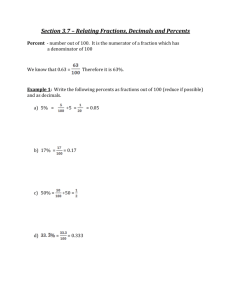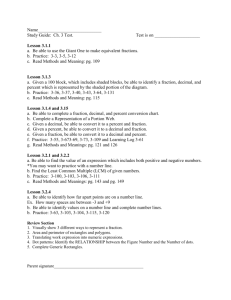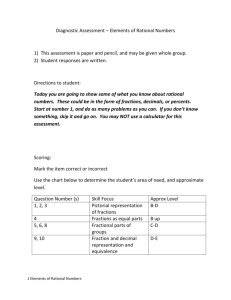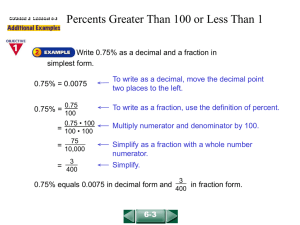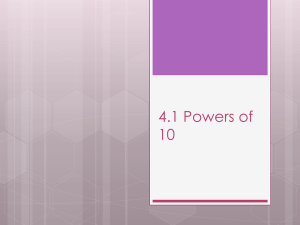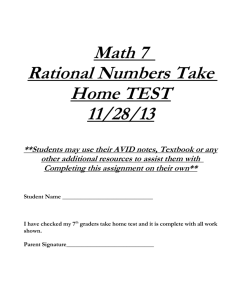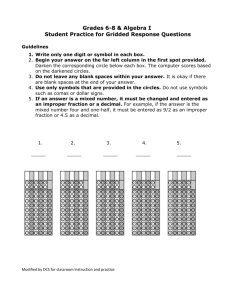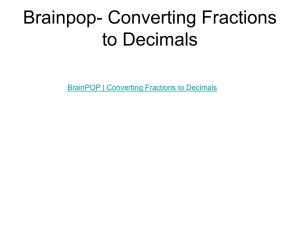Chapter 1.3—Rational Numbers Chapter 1.3-
advertisement
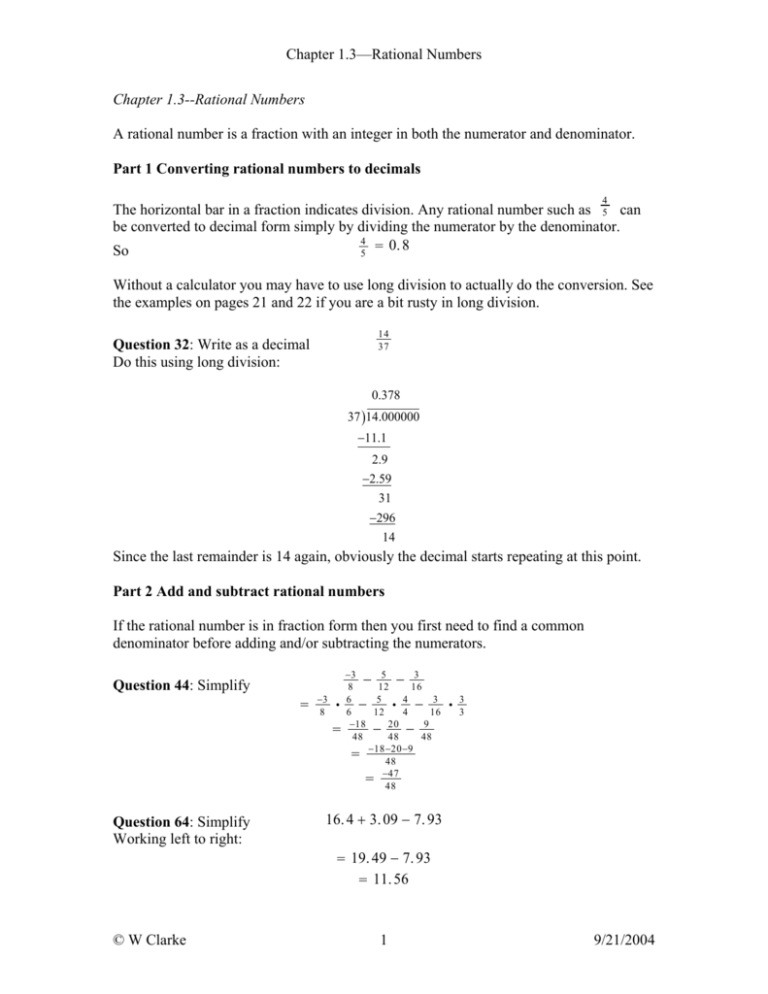
Chapter 1.3—Rational Numbers Chapter 1.3--Rational Numbers A rational number is a fraction with an integer in both the numerator and denominator. Part 1 Converting rational numbers to decimals 4 The horizontal bar in a fraction indicates division. Any rational number such as 5 can be converted to decimal form simply by dividing the numerator by the denominator. 4 0. 8 So 5 Without a calculator you may have to use long division to actually do the conversion. See the examples on pages 21 and 22 if you are a bit rusty in long division. 14 37 Question 32: Write as a decimal Do this using long division: 0.378 37 )14.000000 −11.1 2.9 −2.59 31 −296 14 Since the last remainder is 14 again, obviously the decimal starts repeating at this point. Part 2 Add and subtract rational numbers If the rational number is in fraction form then you first need to find a common denominator before adding and/or subtracting the numerators. Question 44: Simplify −3 8 Question 64: Simplify Working left to right: −3 5 3 − 12 − 16 8 6 5 3 − 12 44 − 16 6 −18 9 − 20 − 48 48 48 −18−20−9 48 −47 48 3 3 16. 4 3. 09 − 7. 93 19. 49 − 7. 93 11. 56 © W Clarke 1 9/21/2004 Chapter 1.3—Rational Numbers Part 3 Multiply and divide rational numbers To multiply rational numbers, simply multiply numerators and multiply denominators. You should always cancel any common factors in both the top and bottom in order to keep your numbers to a manageable size. Question 76: Simplify Canceled a 5 and a 4. 8 − 15 5 12 − 13 1 2 1 3 3 3 2 27 Part 4 Convert among percents, fractions and decimals We addressed conversion from fraction to decimal in part 1. To convert from decimal to fraction move the decimal point to the end of the number and divide by a 1 followed by as many 0 's as you the number of places you moved the point. Example: Convert 2. 34 to a fraction: Move the decimal point two places to the right and divide by 100. 2. 34 234 117 100 50 Don't forget to simplify the fraction! Please don't write your fraction as a mixed fraction! To convert from decimal to percent, simply move the decimal point two places to the right and use a "%" symbol afterward. (i.e. multiply by 100 ) To convert from percent to decimal, divide by 100 and leave off the "%" symbol. (Move the point two places to the left.) To convert from fraction to percent, multiply by 100 and write the "%". To convert from percent to fraction, first convert percent to decimal and then convert decimal to percent. Question 102 Write as a fraction and a decimal: 40 40% 100 0. 4 decimal 4 0. 4 10 25 fraction 1 Question 118 Write as a fraction: 37 2 % 37 1 2 100 2 2 75 200 3 8 Question 126 Write as a decimal: 9. 1% 0. 091 © W Clarke 2 9/21/2004 Chapter 1.3—Rational Numbers 1 Question 138 Write as a percent: 0. 125 12. 5% 12 2 % 2 Question 152 Write as a percent round to the nearest tenth of a percent: 1 7 9 9 Change to an improper fraction: 7 7 100% 128. 571% Divide 900 by 7: Question 155 Write as a percent, write the remainder in fractional form: 5 14 100% 500 % 250 % 35 57 % 7 14 5 14 Question 180 A magic square is one in which the numbers in every row, column, and diagonal sum to the same number. Complete the magic square: ⎡ 8 3 4 ⎤ ⎢ ⎥ 5 1 ⎢ Hint: the following is a magic square 1 5 9 ⎥ 6 6 ⎢ 6 7 2 ⎥ − 13 ⎣ ⎦ It appears that if we take a cell in the magic square on the right, subtract 4 and then divide cr−4 by 6 we get cell on the left; i.e. cl 6 where cl cell of the square on the left and 2 3 cr cell of the square on the right. 8− 4 6 1− 4 6 6−4 6 3− 4 6 5− 4 6 7−4 6 4− 4 6 9− 4 6 = − 2− 4 6 1 3 2 3 1 2 − 16 0 1 6 5 6 1 2 − 13 Notice that the cells in our answer match up with those in the given square. Notice also 1 that everything adds up to . 2 © W Clarke 3 9/21/2004
